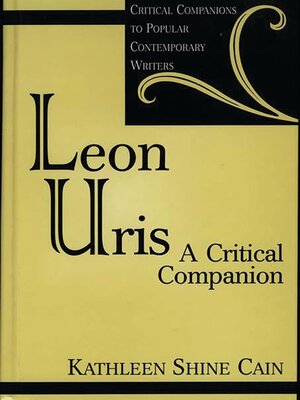Leon Uris
ebook ∣ A Critical Companion · Critical Companions to Popular Contemporary Writers
By Kathleen S. Cain

Sign up to save your library
With an OverDrive account, you can save your favorite libraries for at-a-glance information about availability. Find out more about OverDrive accounts.
Find this title in Libby, the library reading app by OverDrive.



Search for a digital library with this title
Title found at these libraries:
| Loading... |
In eleven novels written over four decades, Leon Uris has chronicled the unceasing fight of dedicated individuals against the forces of oppression, in particular fascism, communism, and imperialism. In the tradition of the historical novel, Uris sets his work during times of crisis (World War II, the founding of Israel, the Irish fight for independence), providing his plots with both political and social tensions as well as personal conflicts. Uris's themes include the indomitability of the human spirit, the power of patriotism, and the restorative capacity of romantic love. Through an exploration of these plots, themes, and characters, this study recognizes Leon Uris as a writer whose examination of good and evil in the context of contemporary history raises important issues that have confronted us all.
This study is the first full-length examination of the work of Leon Uris. Following a biographical chapter that discusses his work in light of his personal history, the study devotes a chapter to his place in the tradition of the historical and political novel. Each of Uris's novels is discussed in an individual chapter: Battle Cry (1953), The Angry Hills (1955), Exodus (1958), Mila 18 (1961), Armageddon: A Novel of Berlin (1963), Topaz (1967), QB VII (1970), Trinity (1976) and Redemption (1995), The Haj (1984), and Mitla Pass(1988). Each novel is analyzed for plot structure, characterization, and thematic elements. In addition, Cain defines and applies an alternative critical perspective from which to read each novel. A complete bibliography of Uris's writing, along with a listing of secondary sources and critical reviews of his work completes the study.
This study is the first full-length examination of the work of Leon Uris. Following a biographical chapter that discusses his work in light of his personal history, the study devotes a chapter to his place in the tradition of the historical and political novel. Each of Uris's novels is discussed in an individual chapter: Battle Cry (1953), The Angry Hills (1955), Exodus (1958), Mila 18 (1961), Armageddon: A Novel of Berlin (1963), Topaz (1967), QB VII (1970), Trinity (1976) and Redemption (1995), The Haj (1984), and Mitla Pass(1988). Each novel is analyzed for plot structure, characterization, and thematic elements. In addition, Cain defines and applies an alternative critical perspective from which to read each novel. A complete bibliography of Uris's writing, along with a listing of secondary sources and critical reviews of his work completes the study.






